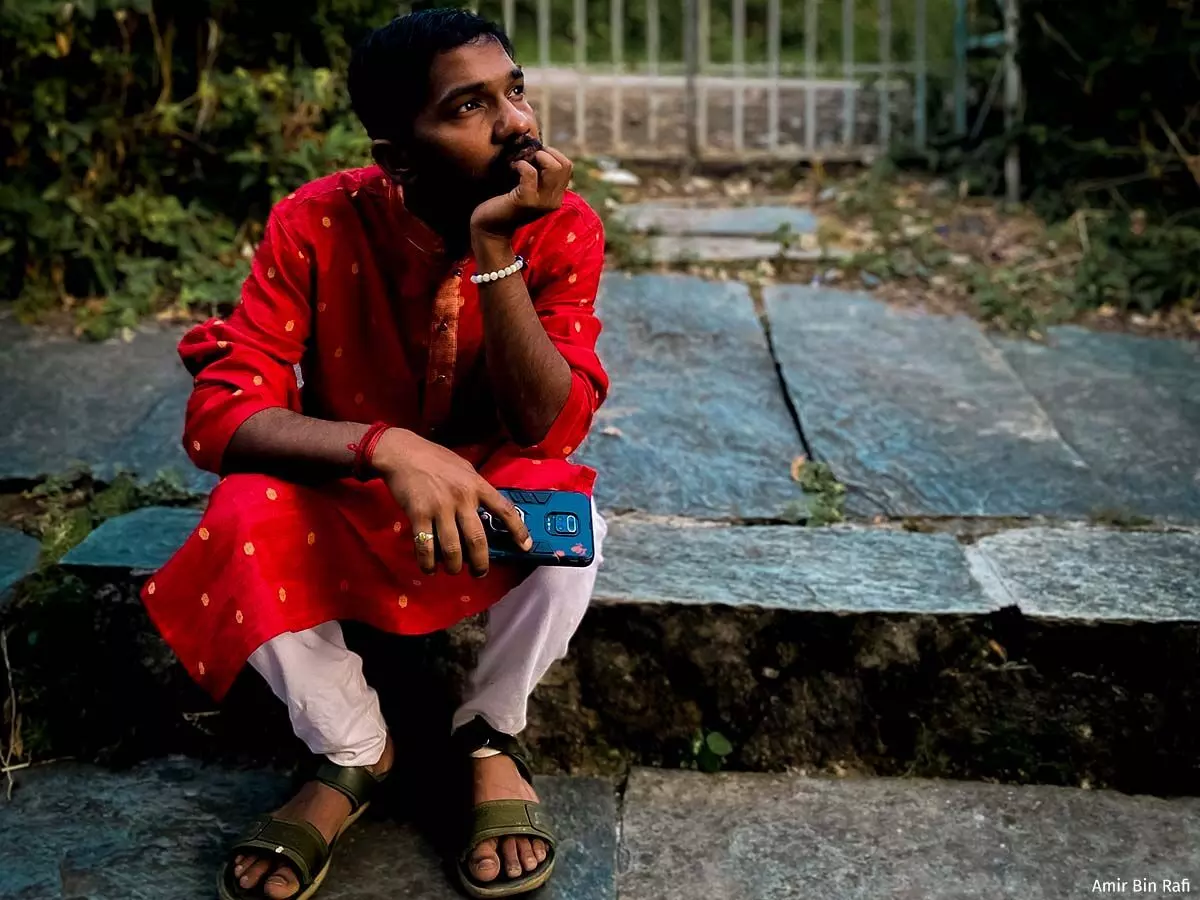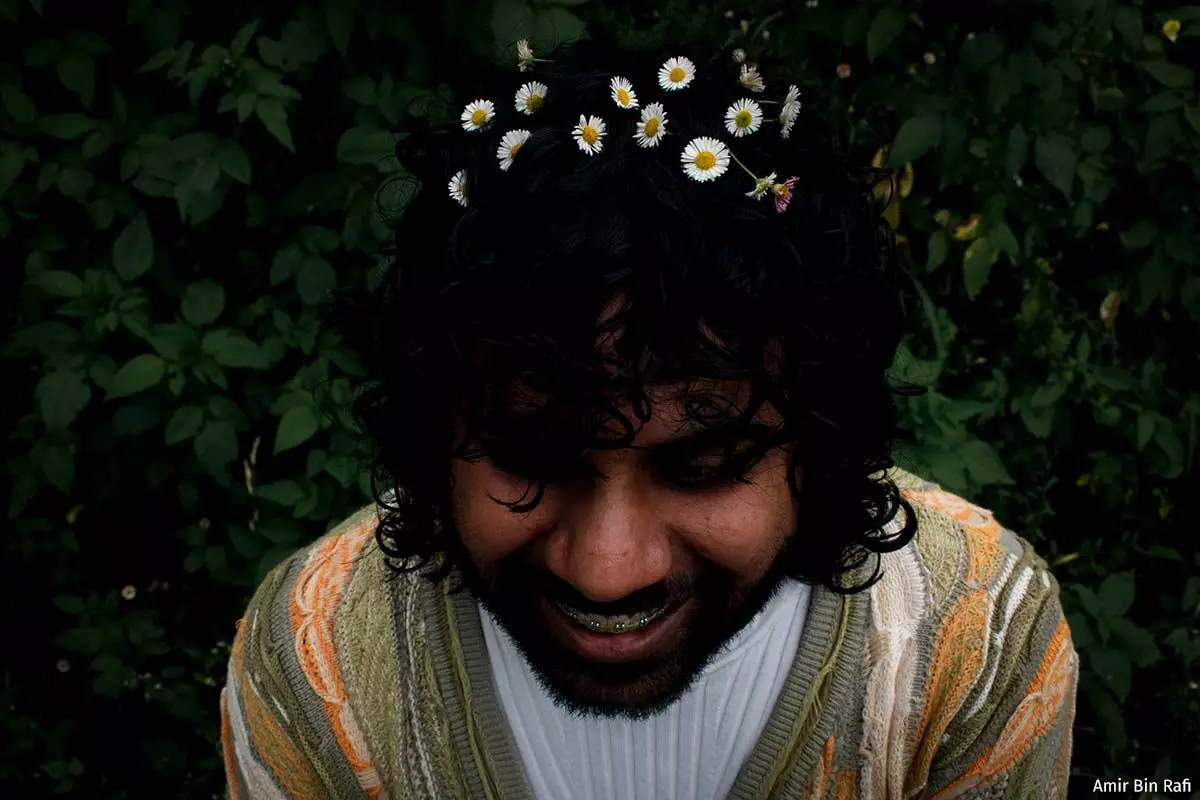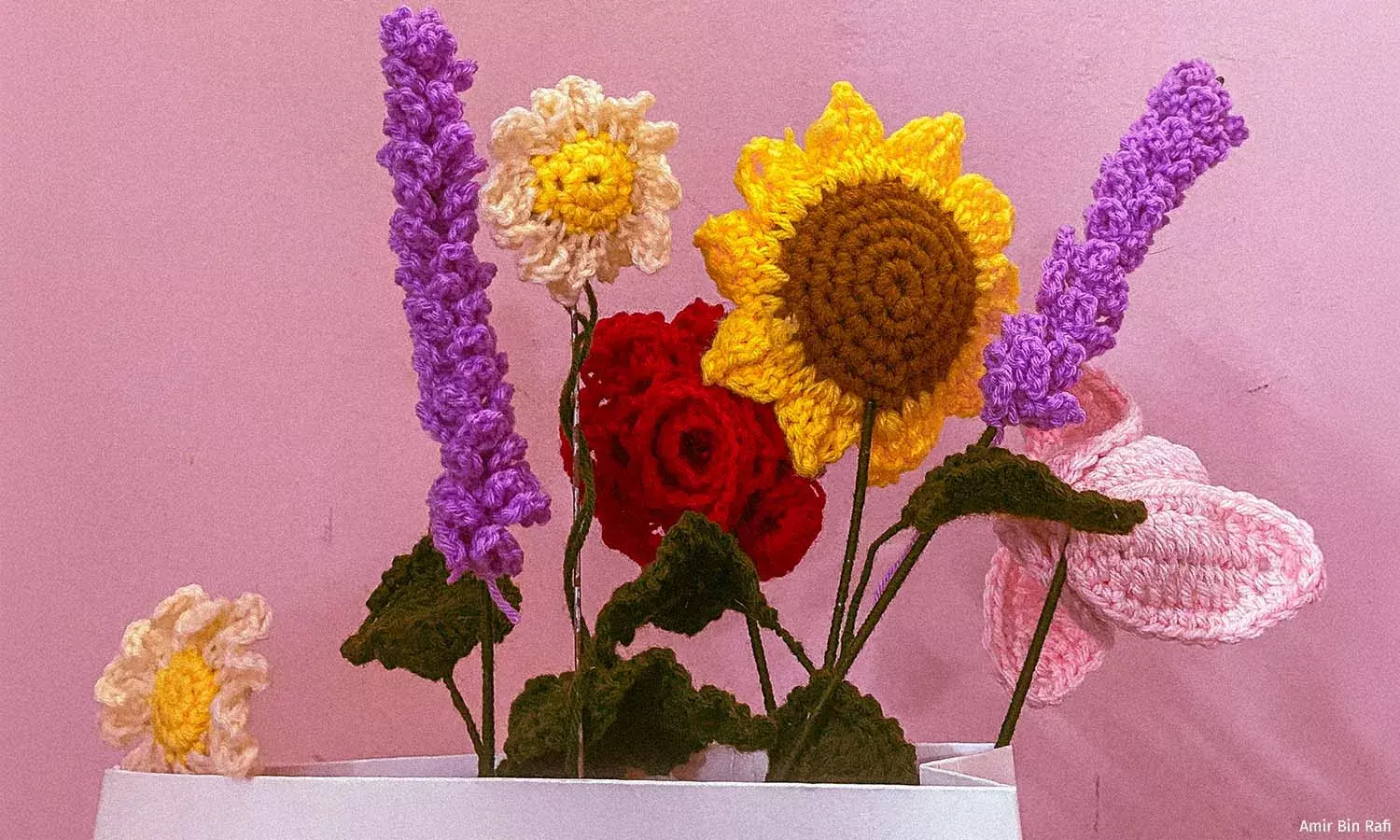Himachal Pradesh: With a brush in his hand and eyes focused on a 2.5 x 4 ft canvas, Suvajit, also known as Rony, is making intricate designs on his newly commissioned Gond painting.
His studio, Aaki Booki, is located in Himachal Pradesh’s Rakkar area, 8 km away from Dharamshala. “When everything was falling apart, these brushes held me together,” the 35-year-old gay artist says, pointing to a box filled with art brushes.
Rony, who hails from Kolkata, earlier worked in Hyderabad. That’s when he faced the “dark side of society,” he says. “People would mock me; they would throw slurs at me, and no one would sit next to me.”
Things only got worse when his human resource (HR) manager ignored his complaints. Rony then decided to move to Dharamshala, which he deemed to be a safer space. After years of struggle and self-identification, Rony now runs an art studio. “This place gives me peace. This is a place that knows no gender,” says Rony, who sometimes organises Pride Bethaks–hour-long sessions where queer individuals come together and discuss issues and life–at his studio.

Suvajit, aka Rony, left a hostile corporate environment in Hyderabad and now runs an inclusive art studio in Himachal. “This place gives me peace. This is a place that knows no gender,” he says.
Rony’s is not an isolated story. Studies in India and abroad reflect the discrimination and harassment faced by individuals from the LGBTQIA+ community in the workplace, with few protections and support, pushing them to seek alternate careers.
Silent struggles
“As someone who has been part of the LGBTQIA+ movement in India for over a decade, I have seen and experienced the many barriers queer individuals face in employment,” says Sonal Giani, a queer activist.
“These challenges are not always loud or dramatic,” she says. Often, they show up in quiet ways through environments where we have to constantly self-edit or work twice as hard to be seen as credible.
“Many LGBTQIA+ people today are turning to alternative platforms like social media or freelance work not just for livelihood but for dignity,” Giani says. “These spaces offer autonomy, creativity, and a way to work without shrinking ourselves to fit into narrow expectations.”
In Delhi, a 27-year-old gay man is working on a crocheted flower bouquet. Sohail (name changed), who hails from Bhopal, joined an NGO in Delhi. “I knew I was a diversity hire,” he says. “My identity was used as a political tool.”
After a few uneventful months, he was asked to conduct a session on gender and sexuality. “I was very happy,” he says, his hands busy crocheting with multi-coloured threads. “I thought this would be a chance for me to open up to all my colleagues and educate them.
“When I started the session, my colleague came up with a religious text and, in front of everyone, told me that I’m ‘haraam,’ that my existence is a curse,” Sohail recalls. The memory brings tears to his eyes and his voice breaks. “It did not end there. I felt all alone. Not a single person came to defend me. I was told to defend myself, my identity, and my existence all on my own.” After months of humiliation, he resigned from the organisation.
“I felt liberated,” he says of that moment. “The environment was so toxic that at times, I couldn’t sleep.”
After the trauma and anxiety, he started his own crochet business on Instagram. “Here, people don’t judge me,” he says about his Instagram presence. Being new to digital business is not easy, but he keeps at it. “I’m getting a good number of orders. From bouquets to scrunchies and sweaters, people are supporting me in my journey. Especially people from the community,” he adds.
A pattern on prejudice
Deepak Tandon, 28, of New Delhi, identifies as a transgender nonbinary person. “I’ve seen the opposite side of embracing your true identity,” Tandon, who goes by ‘Dee’ says, sitting at her godown in Lajpat Nagar. “From parents to classmates and office colleagues, my identity came to be the biggest reason for my mental breakdown.” She left a corporate job after facing slurs and discrimination regularly.
“At the office they would touch me randomly, follow me to the washroom, and openly humiliate me,” Tandon says. “From school to office, the pattern of harassment remained the same.”

Deepak Tandon, a transgender nonbinary person, left a corporate job after facing slurs and discrimination regularly. She now runs an online thrift store with a friend. Their Instagram page has over 41,000 followers, a community that Tandon describes as her family.
Four out of 10 transgender persons face sexual abuse before they turn 18, a 2017 survey of 2,169 people in three states had found, as IndiaSpend reported in January that year. Abuse begins as early as five years but most vulnerable are those aged 11 to 15.
After leaving the corporate world, Tandon, along with a friend, started an online thrift store, ‘Dee & Ron’ (@theelitethrift). This page on Instagram has over 41,000 followers, a community that Tandon describes as her family.
“Whatever I had wanted from my people, I received all of that from my virtual family,” says Tandon. “If some user comments something wrong, my followers make sure to show them their place and correct them. This is the support that I had expected in real life also.”
While the harassment at the office still haunts Tandon, with this online space she feels she has found a new identity. “Through Instagram I found a new identity, which was sabotaged by regular bullying and harassment,” she adds.
Presently, Tandon says, she makes ‘six figures’ through this business. “If I have enough money someday, I would definitely hire a bodyguard to protect me.”
Tandon is open about her identity, including in her attire. “In my family, my sisters accepted me, and I live with them only,” Tandon says. But whenever she steps out of her house, which she describes as her safe space, words like ‘meetha’ and ‘Chakka’ are thrown at her. “Men feel entitled to harass you,” she says.
Numbers behind the neglect
While there are no countrywide surveys or reports, multiple qualitative reports highlight ostracisation and stigma faced by India’s transgender community, as IndiaSpend reported in June 2021.
Transgender children are forced to quit their education due to harassment and bullying, impacting their chances of employment and societal integration. Individuals who identify as transgender often face discrimination from healthcare workers, limiting their access to health services. They are subjected to higher rates of gender-based violence, especially by police personnel. Most of these issues go unreported or underreported due to limited data, we had reported.
Mohit Sharma, a fashion illustrator and designer, said that job discrimination does happen. Some of his queer friends feel they can’t fully express themselves at work because of common stereotypes.
A 2021 survey of 103 LGBT+ individuals containing 10 questions showed that only 17 of the respondents were completely open about their orientation at work, while six were “partially open”. Eight of them reported facing negativity when coming out. Sixteen of the 17 respondents who were open about their orientation said they faced discrimination, including denial of opportunities and promotions, and substandard increments.
Twelve individuals said they faced harassment such as exclusion from colleague groups and verbal abuse/offensive remarks, with one case of physical abuse.
Among the 80 employees not open about their sexuality at work, only 18 (22.5%) plan to come out in the near future, with 27 unsure and 35 having no intention, reflecting workplace insecurity.
The study emphasises the urgent need for workplace protections, as well as a scarcity of employers actively hiring from the LGBTQ+ community or implementing inclusive policies.
A 2024 report from the Williams Institute, a research centre on sexual orientation and gender identity law and public policy at the School of Law under the University of California, Los Angeles detailed the results of a survey of 1,902 LGBTQ individuals in the workforce. Nearly 47% said they faced workplace discrimination or harassment, and 33% reported leaving a job due to unfair treatment based on their identity. Even after landmark legal protections, nearly half still feel the need to hide their identity at work or alter their appearance to avoid mistreatment.
Closeted at work, out on weekends
In Bhopal, 29-year-old Prabhat works as a sales professional for a mid-sized consumer products company. He is on time, courteous, and well-grounded. However, beneath his meticulously staged presentation is a persistent dread that he would lose his career if he were to be overtly feminine or even a little outspoken about his queer identity.
Prabhat laughs along with his male coworkers when they make sexist jokes at work, lowers his voice, and refrains from making wrist motions that could be interpreted as “too soft”.
When asked about marriage, he pretends to have a girlfriend and avoids talking about his personal life. “I feel like I’m acting every day,” he says. “I practice being straight in the same way that I practice my sales pitch.”
Outside of work, he’s a whole different person–joyful, outspoken, and unabashedly feminine. He wears crop tops and eyeliner in the safe spaces where he attends LGBTQ meet-ups on the weekends. However, he never uploads photos to the internet out of concern that someone from his office would find them.
In 2017, a report submitted to the National Human Rights Commission of India by the Kerala Development Society found that 96% of transgender people were denied jobs, 92% were denied the right to participate in any form of economic activity, and 18% suffered physical abuse.
An October 2024 paper published in the International Journal for Multidisciplinary Research identifies key structural barriers faced by LGBTQIA+ individuals in Indian workplaces. The paper highlights how transgender persons, in particular, are subjected to misgendering, workplace hostility, and microaggressions that hamper their professional growth.
Despite the 2018 Supreme Court ruling decriminalising same-sex relations, the authors note that “there remains a substantial gap between legal frameworks and their implementation in practice. Many LGBT employees continue to face routine discrimination and harassment, underscoring the need for more robust and inclusive measures within organizations.”
A 2021 survey of 201 business leaders published by HR consulting firm Randstad India revealed that 53% organisations do not have career-development opportunities for people from the LGBTQ+ community, 40% provide training to reduce hiring bias and 9.5% reported making efforts to be LGBTQ+ inclusive.
According to 2023 Equity Rising report by the US-based Human Rights Campaign, which conducted a survey of over 3,000 workers including 2,000 LGBTQ+ workers, found that 40% LGBTQ+ workers withheld their identity due to actual or perceived risk of violence, stigma and victimisation, 35% have heard their colleagues make jokes and/or negative comments about gay or lesbian people, or about transgender people, and 31% said their colleagues seem uncomfortable when they talk about their sexual orientation. More than half the transgender and non-binary workers say they have felt unhappy or depressed at work.
According to a World Bank study conducted in 2014, 56% of LGBTQ+ people reported discrimination in white-collar jobs in the country.
The authors reached out to officials in the Ministry of Labour and Employment for comment on steps being taken to address such discrimination. We will update this story when we receive a response.
Amir Bin Rafi is a Kashmir-based journalist.
Mansi Rathee is a Delhi-based lawyer and journalist who covers issues related to human rights and women’s empowerment.
Indiaspend.org is a data-driven, public-interest journalism non-profit

